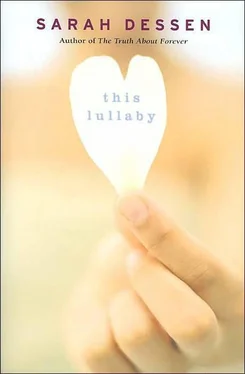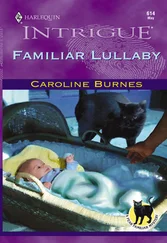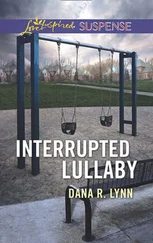“Late,” he said flatly.
I glanced at my watch. It was 6:03, which, according to Chloe and Lissa and everyone else who had always made me wait, meant I was well within the bounds of the official within-five-minutes-doesn’t-count-as-late rule. But something told me maybe I shouldn’t point this out just now.
“She’s here!” Chris called out over his shoulder, then shot me the stink eye as I walked in, shutting the door behind me.
“I’ll be right out,” Jennifer Anne replied, her voice light. “Offer her something to drink, would you, Christopher?”
“This way.” Chris started into the living room. As we walked, our shoes made swishy noises on the carpet. It was the first time I’d been to Jennifer Anne’s, but I wasn’t surprised by the decor. The sofa and the love seat were both a little threadbare and matched the border of the wallpaper. Her diploma from the community college hung on the wall in a thick gold frame. And the coffee table was piled with thick, pretty books about Provence, Paris, and Venice, places I knew she’d never been, arranged with great care to look as though they were stacked casually.
I sat down on the couch, and Chris brought me a ginger ale, which he knew I hated but thought I deserved. Then we sat down, him on the couch, me on the love seat. Across from us, over the fake fireplace, a clock was ticking.
“I didn’t realize this was a formal occasion,” I said, nodding at his tie.
“Obviously,” he replied.
I glanced down at myself: I had on jeans, a white T-shirt, with a sweater tied around my waist. I looked fine, and he knew it. There was a clang from the kitchen, which sounded like an oven closing, and then the door swung open and Jennifer Anne emerged, smoothing her skirt with her hands.
“Remy,” she said, coming over and bending down to kiss my cheek. This was new. It was all I could do not to pull back, if only from surprise, but I stayed put, not wanting another dirty look from my brother. Jennifer Anne settled down beside him on the couch, crossing her legs. “I’m so glad you could join us. Brie?”
“Excuse me?”
“Brie,” she repeated, lifting a small glass tray from the end table and extending it toward me. “It’s a soft cheese, from France.”
“Oh, right,” I said. I just hadn’t heard her, but now she looked very pleased with herself, as if she actually thought she’d brought some foreign culture into my life. “Thank you.”
We were not given the opportunity to see if the conversation would progress naturally. Jennifer Anne clearly had a list of talking points she had culled from the newspaper or CNN she believed would allow us to converse on a level she deemed acceptable. This had to be a business tactic she’d picked up from one of her self-improvement books, none of which, I noticed, were shelved in the living room on public display.
“So,” she said, after we’d all had a cracker or two, “what do you think about what’s happening with the elections in Europe, Remy?”
I was taking a sip of my ginger ale, and glad of it. But finally I had to reply. I said, “I haven’t been following the news lately, actually.”
“Oh, it’s fascinating,” she told me. “Christopher and I were just discussing how the outcome could affect our global economy, weren’t we, honey?”
My brother swallowed the cracker he’d been eating, cleared his throat, and said, “Yes.”
And so it went. In the next fifteen minutes, we had equally fascinating discussions about genetic engineering, global warming, the possibility of books being completely obsolete in a few years because of computers, and the arrival at the local zoo of a new family of exotic, nearly extinct Australian birds. By the time we finally sat down for dinner, I was exhausted.
“Great chicken, sweetheart,” my brother said as we all dug into our plates. Jennifer Anne had prepared some complicated-looking recipe involving chicken breasts stuffed with sweet potatoes topped with a vegetable glaze. They looked perfect, but it was the kind of dish where you just knew someone had to have been pawing at your food for a long while to get it just right, their fingers all in what now you were having to stick in your mouth.
“Thank you,” Jennifer replied, reaching over to pat his hand. “More rice?”
“Please.” Chris smiled at her as she dished food onto his plate, and I realized, not for the first time, that I hardly recognized my brother anymore. He was sitting there as if this was the life he was used to, as if all he’d ever known was wearing a tie to dinner and having someone fix him exotic meals on what clearly were the good plates. But I knew differently. We’d shared the same childhood, were raised by the same woman, whose idea of a home-cooked meal involved Kraft dinner, Pillsbury biscuits, and a pea-and-carrot combo from a can. My mother couldn’t even make toast without setting off the smoke detector. It was amazing we’d even made it past grade school without getting scurvy. But you wouldn’t know that now. The transformation of Chris, my stoner brother with a police record, to Christopher, man of culture, ironing, and established career of lubrication specialist was almost complete. There were only a few more kinks to work out, like the lizards. And me.
“So your mother and Don get back Friday, correct?” Jennifer Anne asked me.
“Yep,” I said, nodding. And maybe it was those meticulously made chicken rolls, or the fakeness of the entire evening thus far, but something suddenly kicked up my evil side. I turned to Chris and said, “So we haven’t done it yet, you know.”
He blinked at me, his mouth full of rice. Then he swallowed and said, “What?”
“The wager.” I waited for him to catch up, but either he didn’t or was pretending not to.
“What wager?” Jennifer Anne asked, gamely allowing this divergence from her scripted dinner conversation.
“It’s nothing,” Chris mumbled. He was trying to kick me under the table, but hit a leg instead, rattling Jennifer Anne’s butter dish.
“Years ago,” I said to Jennifer Anne, as he took another swipe, barely nicking the sole of my shoe, “when my mother married for the second time, Chris and I started a tradition of laying bets on how long it would last.”
“This bread is just great,” Chris said quickly to Jennifer Anne. “Really.”
“Chris was ten, and I must have been six or so,” I continued. “This was when she married Harold, the professor? The day they left for the honeymoon, we each sat down with a pad of paper and calculated how long we thought they’d stay together. And then, we folded up our guesses and sealed them in an envelope, which I kept in my closet until the day my mother sat us down to tell us Harold was moving out.”
“Remy,” Chris said in a low voice, “this isn’t funny.”
“He’s just mad,” I told her, “because he’s never won yet. I always do. Because it’s like blackjack: you can’t go over. Whoever comes closest to the actual day wins. And we’ve had to really be specific about the rules over the years. Like it’s the day she tells us it’s over, not the official separation day. We had to establish that because when she and Martin split Chris tried to cheat.”
Now, Chris was just glaring at me. Sore loser.
“Well, I think,” Jennifer Anne said, her voice high, “that is just horrible. Just horrible. ” She put down her fork carefully and pressed her napkin to her lips, closing her eyes. “What an awful way to look at a marriage.”
“We were just kids,” Chris said quickly, putting his arm around her.
“I’m just saying,” I said, shrugging, “it’s like a family tradition.”
Jennifer Anne pushed out her chair and picked up the chicken dish. “I just think that your mother deserves better,” she snapped, “than for you to have so little faith in her.” And then she walked into the kitchen, the door swinging shut behind her.
Читать дальше












